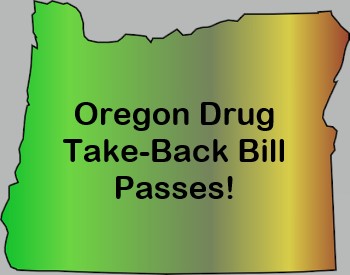A fourth state Legislature has voted overwhelmingly for a pharmaceutical stewardship, a.k.a. extended producer responsibility, approach to providing convenient drug take-back services to all residents. After many years of discussion on the issue, the Oregon Legislature took action to help combat the opioid epidemic by requiring the pharmaceutical industry to fund, design, and operate a secure, convenient, and environmentally sound, drug take-back program.
HB 3273 B – Safe Drug Disposal passed the Oregon Senate 27-2 after a House vote of 56-3. Governor Kate Brown is expected to sign the bill. This will make Oregon the 4th state in the nation – after WA, NY, and CA – to enact a pharmaceutical stewardship law.
Congratulations to Representative Sheri Schouten (D-27, Beaverton), the bill’s prime sponsor! Congratulations to all the organizations and agencies who worked hard to pass this good bill, which included: League of Oregon Cities, Association of Oregon Counties, OR State Pharmacy Association, OR Society of Health System Pharmacists, OR Nurses Association, Coalition of Local Health Officials, OR Association of Clean Water Agencies (ACWA), the Washington County Board of Commissioners, and the OR Pediatric Society. Many of these organizations have been working for years on this issue, which was initially championed almost a decade ago by OR ACWA.
“This program will deliver multiple benefits,” said Rep. Sheri Schouten, a chief sponsor of the legislation and longtime proponent. “A safe, convenient way to dispose of drugs will reduce accidental poisonings and access to opioids by removing unused drugs from our homes. This program is cost-effective, with an anticipated cost to industry of less than a dollar per year per resident of Oregon. But for me, this issue is fundamentally about addictions. We know that 80 percent of heroin users start by abusing pain medications, and that 70 percent of individuals who abuse opioids get them from friends or family – often by theft.”
I was pleased to play a role over the years by collaborating with several of these Oregon groups, providing drug take-back briefings for Oregon legislators, and providing insights from our pharmaceutical stewardship policy development and legislative battles in Washington State. During the 2019 session, I provided consultation to support the great work done by Abby Boudouris of the Oregon Department of Environmental Quality, which also supported passage of this legislation. It was great to be part of Abby’s team, providing policy analysis, refinement of legislative amendments, and background resources explaining anticipated program costs and how similar manufacturer-provided drug take-back programs are working well in counties in neighboring Washington State.
Once again, the pressure of passage of a local ordinance (well done Washington County, OR!) and the imminent spread of more local laws, helped pushed the pharmaceutical industry to the negotiating table on a state bill. The strong votes in both chambers show that legislators understand the need for a robust and sustainable drug take-back program and also support requiring the pharmaceutical industry to finance and operate the program. However, don’t let the supermajority “Yes” floor votes fool you. A lot of hard and smart work is needed to get to this strong outcome, through policy development, building a strong coalition of proponents, and effective lobbying throughout the session as the pharmaceutical industry’s myriad of lobbyists put forward new twists and turns.
The Oregon legislation was primarily modeled on Washington State’s Secure Drug Take-Back Act of 2018. The policies are very similar in requiring manufacturers to provide a convenient statewide drug take-back program, with at least 1 secure drop box in each county, and 1 box in every city or town, and additional drop boxes for every 50,000 people in each city or town. Prepaid mail-back envelopes will also be available to all residents, and specifically to in-home hospice services. Collectors, such as pharmacies and hospitals, are not required to participate; but, importantly, any qualified authorized collector that wants to participate in the manufacturers’ program must be included. Pharmaceutical manufacturers selling “covered drugs” in Oregon will fund, design, operate, and promote the drug take-back program.
In several regards, the Oregon bill is stronger than the WA law (no sunset clause, for example). On some other issues, the Oregon bill has some compromises as a result of PhRMA lobbying (such as exclusion of biologic drugs and pet medicines). I will be posting policy comparison analysis on my Safer Meds page soon to help other jurisdictions and advocates wanting to craft the strongest policy that provides the best services to residents.
Great to see the momentum for pharmaceutical stewardship growing to help protect our families from medicine abuse and poisonings, and keep these drugs out of our waterways! Well done Oregon!

Recent Comments